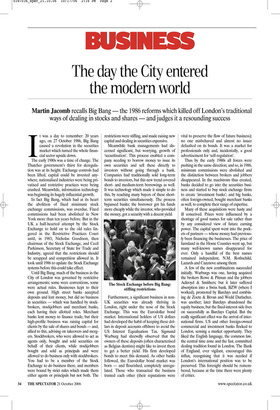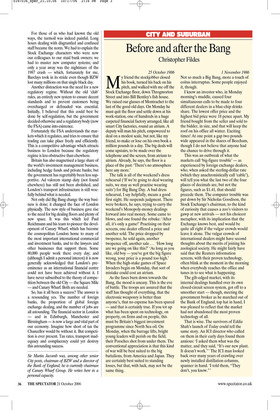The day the City entered the modern world
Martin Jacomb recalls Big Bang — the 1986 reforms which killed off London’s traditional
ways of dealing in stocks and shares — and judges it a resounding success
It was a day to remember: 20 years ago, on 27 October 1986, Big Bang caused a revolution in the securities market which turned the whole financial sector upside down. The early 1980s was a time of change. The Thatcher government’s thirst for deregulation was at its height. Exchange controls had been lifted, capital could be invested anywhere, nationalised industries were being privatised and restrictive practices were being crushed. Meanwhile, information technology was beginning its hugely influential growth.
In fact Big Bang, which had at its heart the abolition of fixed minimum stock exchange commissions, was overdue. Fixed commissions had been abolished in New York more than ten years before. But in the UK a half-hearted attempt by the Stock Exchange to hold on to the old rules lingered in the Restrictive Practices Court until, in 1983, Nicholas Goodison, then chairman of the Stock Exchange, and Cecil Parkinson, Secretary of State for Trade and Industry, agreed that the restrictions should be scrapped and competition allowed in. It took until 1986 to update the Stock Exchange systems before this could take effect.
Until Big Bang, much of the business in the City of London was governed by restrictive arrangements; some were conventions, some were actual rules. Businesses kept to their own ground. High street banks accepted deposits and lent money, but did no business in securities — which was handled by stockbrokers, stockjobbers and merchant banks, each having their allotted roles. Merchant banks lent money to finance trade, but their high-profile business was raising capital for clients by the sale of shares and bonds — and, allied to this, advising on takeovers and mergers. Stockbrokers, who were allowed to act as agents only, bought and sold securities on behalf of their clients, while stockjobbers bought and sold as principals and were allowed to do business only with stockbrokers. You had to be a member of the Stock Exchange to do business there, and members were bound by strict rules which made them either agents or principals but not both. The restrictions were stifling, and made raising new capital and dealing in securities expensive.
Meanwhile bank managements had discerned significant, but worrying, growth of ‘securitisation’. This process enabled a company needing to borrow money to issue its own securities and sell these directly to investors without going through a bank. Companies had traditionally sold long-term bonds to investors, but this new trend covered shortand medium-term borrowings as well. It was technology which made it simple to do this, by reaching many buyers of these shortterm securities simultaneously. The process bypassed banks; the borrower got his funds more cheaply while the investor, who provided the money, got a security with a decent yield.
Furthermore, a significant business in nonUK securities was already thriving in London, right under the nose of the Stock Exchange. This was the Eurodollar bond market. International holders of US dollars had developed the habit of keeping these dollars in deposit accounts offshore to avoid the US Interest Equalisation Tax. Sigmund Warburg had shrewdly observed that the owners of these deposits (often characterised as Belgian dentists) might like to invest them to get a better yield. His firm developed bonds to meet this demand. As other banks followed, the Eurodollar bond market was born — and flourished, completely unregulated. Those who transacted the business trusted each other (their reputations were vital to preserve the flow of future business); no one misbehaved and almost no issuer defaulted on its bonds. It was a market for professionals only and, incidentally, a good advertisement for ‘self-regulation’.
Thus by the early 1980s all forces were pushing in the same direction; and so, in 1986, minimum commissions were abolished and the distinction between brokers and jobbers disappeared. In the maelstrom thus created, banks decided to go into the securities business and started to buy stock exchange firms to create ‘investment banks’; and big banks, often foreign-owned, bought merchant banks as well, to complete their range of expertise.
Many of these acquisitions were hasty and ill conceived. Prices were influenced by a shortage of good names for sale rather than by any considered view of future earning power. The capital spent went into the pockets of partners — whose money had previously been financing the businesses. The price of farmland in the Home Counties went up, but many well-known names disappeared for ever. Only a handful of the best names remained independent, N.M. Rothschild, Lazards and Cazenove among them.
A few of the new combinations succeeded initially. Warburgs was one, having acquired the brokers Rowe & Pitman and the jobbers Ackroyd & Smithers; but it later suffered absorption into a Swiss bank. BZW (where I worked), promoted by Barclays and combining de Zoete & Bevan and Wedd Durlacher, was another; later Barclays abandoned the equity business, but the fixed-interest side lives on successfully as Barclays Capital. But the really significant effect was the arrival of international firms. US and other foreign-owned commercial and investment banks flocked to London, sensing a market opportunity. They liked the English language, the common law, the central time zone and the fast, committed dealing tradition found in London. The Bank of England, ever vigilant, encouraged this influx, recognising that it was needed if London’s international position was to be preserved. This foresight should be remembered, because at the time there were plenty of critics. For those of us who had known the old ways, the turmoil was indeed painful. Long hours dealing with disgruntled and confused staff became the norm. We had to explain the Stock Exchange characters who were now our colleagues to our staid bank owners; we had to master new computer systems; and only a year away was the nightmare of the 1987 crash — which, fortunately for me, Barclays took in its stride even though BZW lost many millions on that single black day.
Another distraction was the need for a new regulatory regime. Without the old ‘club’ rules, an entirely new system to ensure decent standards and to prevent customers being overcharged or defrauded was essential. Initially, I believed that this could best be done by self-regulation, but the government decided otherwise and a regulatory body (now the FSA) came into existence.
Fortunately the FSA understands the markets which it regulates, and tries to ensure that trading can take place freely and efficiently. This is a competitive advantage which attracts business to London because the regulatory regime is less obstructive than elsewhere.
Britain has also magnetised a large share of the world’s investment management business, including hedge funds and private banks; but the government has regrettably been less supportive. Ad valorem stamp duty (not found elsewhere) has still not been abolished, and London’s transport infrastructure is still woefully behind what is needed.
Not only did Big Bang change the way business is done; it changed the face of London physically. The new style of business gave rise to the need for big dealing floors and plenty of new space. It was this which led Paul Reichmann and his team to pioneer the development of Canary Wharf, which has become the cosmopolitan London home to many of the most important international commercial and investment banks, and to the lawyers and other businesses that support them. Some 80,000 people work there every day; and (although I admit a personal interest) it is now generally acknowledged that London’s preeminence as an international financial centre could not have been achieved without it. I have never subscribed to the theory of competition between the old City — the Square Mile — and Canary Wharf. Both are needed.
So, has it all been a success? The answer is a resounding yes. The number of foreign banks, the proportion of global foreign exchange dealing, and the number of jobs are all astounding. The financial sector in London — and in Edinburgh, Manchester and Birmingham — is now a large and vital part of our economy. Imagine how short of tax the Chancellor would be without it. But competition is ever present. Tax rates, transport inadequacy and complacency could yet destroy this astounding success.



































































































 Previous page
Previous page